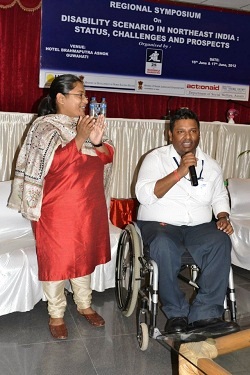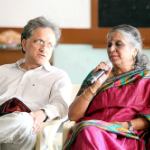“Where will I go?” The young woman had burns on 80 percent of her body. She was in a New Delhi hospital where the doctors expected her to die any moment. She had been set on fire by her husband And that was what she told me when I asked why she had not left him earlier and why she put up with all the beatings and torture.
What I learnt that day as a young reporter remains just as true almost two decades later. It is essential for a billion to rise against gender violence – as they are doing on this day dedicated to love. It was essential for almost all Indians to come together against the rape in a Delhi bus last December. It is essential to protest and legislate against gender discrimination from the womb to the last rites. But it is not enough.
In language that India’s economist Prime Minister will surely understand, it is a necessary but not a sufficient condition.
What will bring it closer to sufficiency is to find satisfactory answers to that question, “where will I go?” Given the scale of gender violence and gender discrimination in this country, the number of safe and supportive places to which victims can go is negligible. That is the hard part which must be done if we are to make any dent in the overwhelming patriarchy in which we exist. And there is very little sign that such steps are being taken.
We now have a vocal minority able and willing to raise their voices against gender violence and gender discrimination. But we must not forget that it is a minuscule minority, compared to the number of victims. These victims, sometimes emerge as ‘survivors’. But the journey is not easy. A wife beaten by her husband does not want to stay on with him. A woman molested or raped wants justice. The problem that most of them face is that if they take the steps they should logically take, the patriarchal society fights them all the way. When a young woman goes crying to her parents and says she has been beaten by her husband, most Indian parents say she should “adjust” instead of going with her to the police station and lodging a complaint. Why do the parents do that? Because they fear what their “society” will say, they fear they will not be able to get the other women in the family married off. That was the exact reason the burn victim had given me. “I have five younger sisters,” she had said from her hospital bed. “If I left my husband’s house and gone to my parents, the sisters would not be able to get married.” And if she ignored all that and decided to go out on her own, I asked her. “Where will I go?”
We have to realise that part of the effect of gender discrimination is to make most victims unfit to face life by themselves. Unless we are able to help these victims, processions and demonstrations and marks of outrage in the social media will have very limited impact. I am talking about actual brick and mortar help – shelters to which the women can go without any fear that they would further victimised physically or psychologically; proper rehabilitation programmes so that they could make a life for themselves without staying economically dependent on that very same abusive husband or those reluctant parents. And when I talk of economic independence I do not talk only of their ability to earn a living. I include the ability to negotiate day-to-day lives by themselves, simple things like opening and operating a bank account on their own, getting life and health insurance policies, paying utility bills, filing tax returns. There are far too many things for which far too many Indian women depend on male members of the family – first the father, then the husband, then the son. This applies also to educated women who should be able to do all this with perfect ease. It is a part of gender discrimination that women are not encouraged to make financial decisions that affect their lives. Those who are able to take that power need to do so. The rest need to be helped to reach that position.
I am not going list the myriad ways in which women are discriminated against, from the womb to the last rites. We know that. We also know that it is perhaps inevitable in a society that remains deeply feudal and totally patriarchal despite the patina of equality of all human beings in a democracy. The question is, what are we going to do about the situation? And when I say we, I mean people who are at least in a position to start protesting. We know what a small number that is. If we want to enlarge that, if we want to help the majority of victims of gender violence and gender discrimination, we have to go beyond protests. We have to take concrete steps to counter discrimination – from ensuring that the laws against sex-determination tests are implemented, to ensuring that girls in government-run schools are not pulled out due to lack of toilets, to building a network that will complain to the police whenever anyone hears about a child marriage, and so on.
Let us rise, one billion and more, to say “no” to violence against women, and to affirm love. But let us also make sure that those who muster courage to fight bravely against violence have a concrete support system. We need many more shelters and rehabilitation centres all over the country. And they must be shelters and centres where their purpose is served honestly, both in physical and psychological terms.
Find us on facebook: facebook.com/TheThumbPrintMag







































